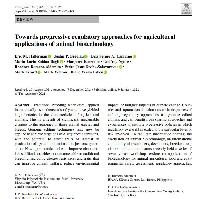Resumen
- Traditional breeding techniques, applied incrementally over thousands of years, have yielded huge benefits in the characteristics of agricultural animals. This is a result of significant, measurable changes to the genomes of those animal species and breeds. Genome editing techniques may now be applied to achieve targeted DNA sequence alterations, with the potential to affect traits of interest to production of agricultural animals in just one generation. New opportunities arise to improve characteristics difficult to achieve or not amenable to traditional breeding, including disease resistance, and traits that can improve animal welfare, reduce environmental impact, or mitigate impacts of climate change. Countries and supranational institutions are in the process of defining regulatory approaches for genome edited animals and can benefit from sharing approaches and experiences to institute progressive policies in which regulatory oversight is scaled to the particular level of risk involved. To facilitate information sharing and discussion on animal biotechnology, an international community of researchers, developers, breeders, regulators, and communicators recently held a series of seven virtual workshop sessions on applications of biotechnology for animal agriculture, food and environmental safety assessment, regulatory approaches, and market and consumer acceptance. In this report, we summarize the topics presented in the workshop sessions, as well as discussions coming out of the breakout sessions. This is framed within the context of past and recent scientific and regulatory developments. This is a pivotal moment for determination of regulatory approaches and establishment of trust across the innovation through-chain, from researchers, developers, regulators, breeders, farmers through to consumers.
